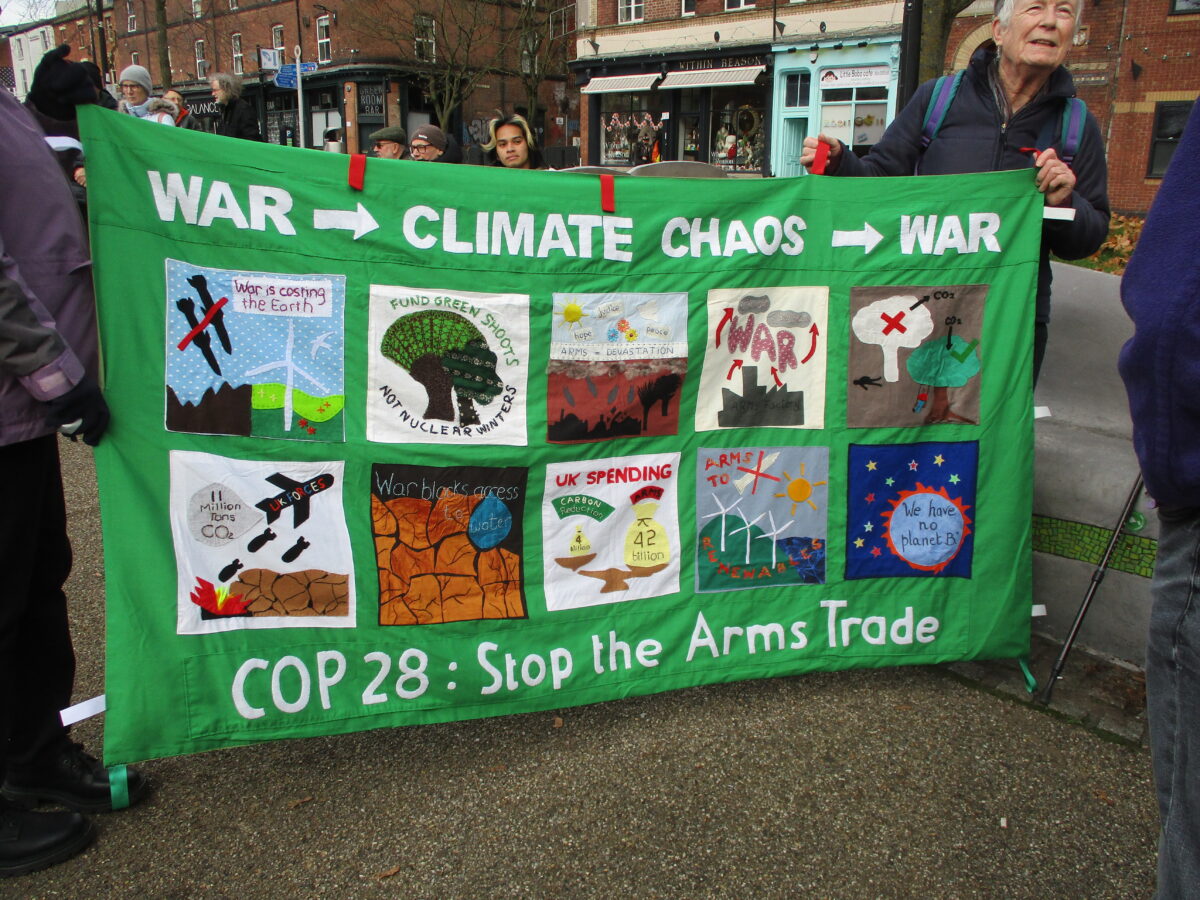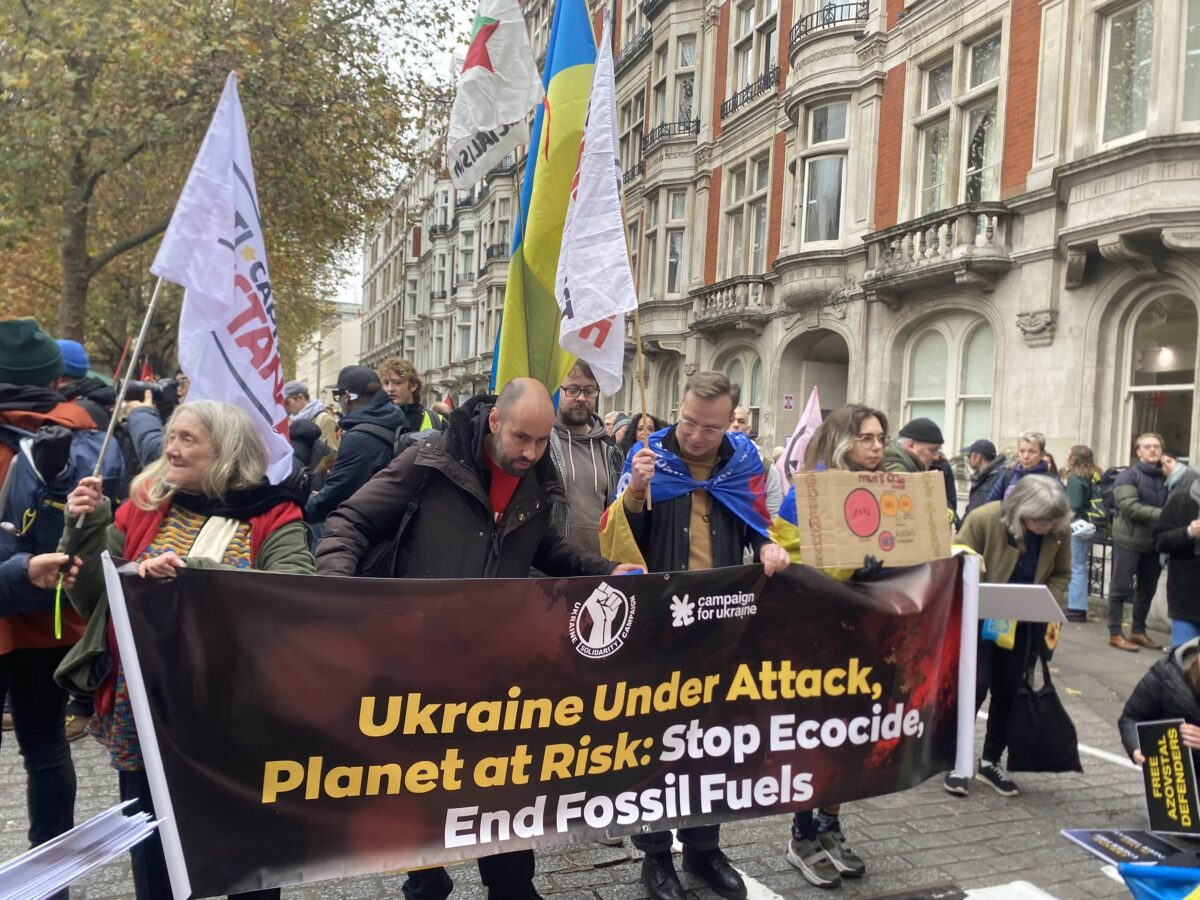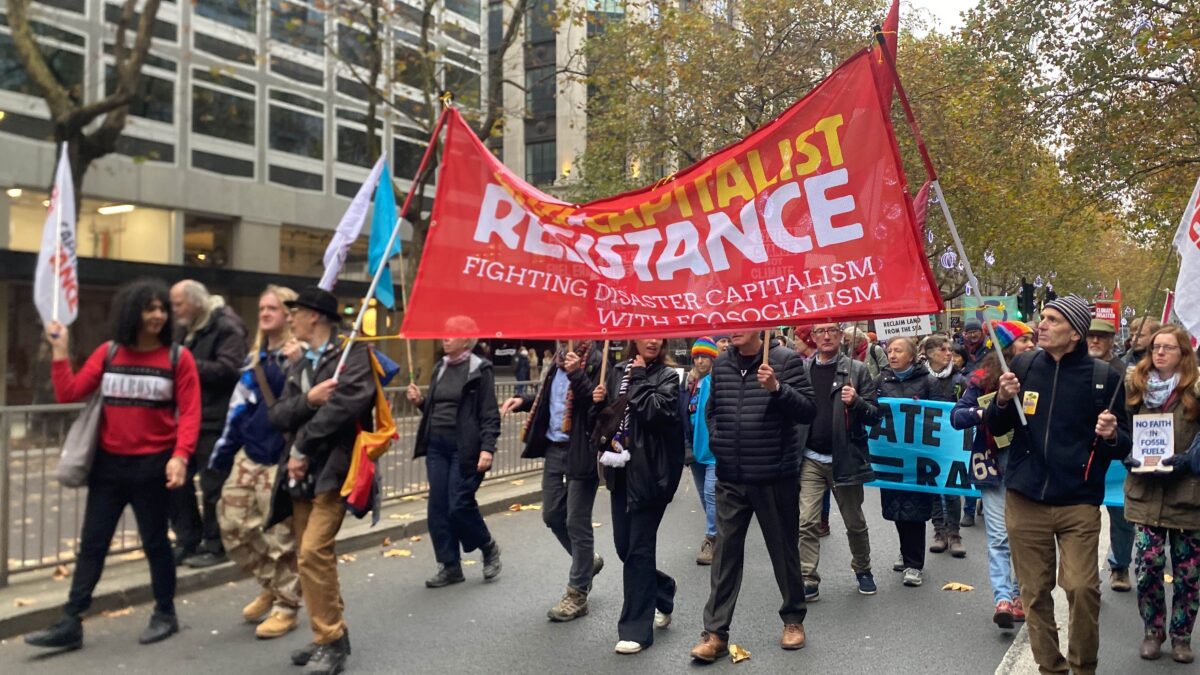In London around 2,000 protesters gathered outside the British museum and marched to Parliament Square, going passed the HQ of SOCAR, the Azerbaijan-owned oil company. Senior Azerbaijani oil industry people were caught red handed using the COP summit as a chance to organise new business deals, a repeat of what happened at COP28 in Dubai.
Sadly, scandals like these are now commonplace, showing the degree of institutional capture of the COP process. Then half way through COP29 the Saudi delegates declared that they would not support any final statement that included specific mention of ending fossil fuels. Since the COP statement has to be agreed by consensus this means anything coming out of Azerbaijan in 2024 will be next to useless on the key issue of the green transition.
There were other protests in several other cities including Sheffield and Manchester.

A few hundred protesters bravely gathered in Baku itself to mount a silent protest around one of the main conference halls. Organiser there said they were disappointed with the lack of progress at COP29 and were not hopeful for any major break throughs.
Ecocide in Gaza
One of the important links made for these protests was linking up with the Palestinian cause. The environment and Palestine are not separate issues – any war is environmentally devastating and the genocide in Gaza is no exception.
The Israel Death Forces are systematically destroying the basis for life in Gaza and parts of the West Bank. The destruction of homes is the clearest example, alongside universities, schools and hospitals. But they have also targeted the natural environment.
Ecocide is the destruction of the living environment. Even if the killing stopped today it would mean that life in Gaza would be impossible, if the ecology of a place is destroyed then how can humans live there? Farms have been blitzed, coastal areas polluted, massive deforestation and many water tables polluted. The use of phosphorous bombs by the IDF is particularly damaging in this respect.
Talking about the destruction of the environment is a crucial aspect to the question of genocide, how the destruction of a people happens not just though killing them but through the land and water they need to live on. Israel’s policy is to obliterate the Palestinians as a people, scatter them into Egypt or Jordan or Lebanon (whilst also annexing parts of those countries in their struggle to create Greater Israel) and the ecological devastation they are wrecking on the area is not a by-product but a central part of that final goal.
Environmental devastation in Ukraine

Whilst some on the left refuse to support the Ukranian’s fight against an imperialist invasion by Russia, a small group of Ukranian’s came on the London protest to remind people that the consequences of Russia’s invasion have also been environmentally devastating for their country. The worst example was the destruction of the Kakhovka dam by Russia in June 2023 which caused extensive environmental damage as the lower Dnieper river flooded, wiping out villages and killing fish and other animals in the area. Some experts labelled the destruction of the Dam as the worst environmental disaster in Europe since the nuclear reactor Chernobyl (also in Ukraine!) exploded in 1986.
The destruction of the dam led to the spilling of 150 tonnes of chemical lubricants into the river and then into the Black Sea, alongside fuels like petrol and also countless landmines. This is only one crisis caused by the invasion, one report in the Journal of Occupational Medicine and Toxicology explained that “There has been widespread chemical contamination of air, water, and soil, and 30% of Ukraine has been contaminated with landmines and unexploded ordnance. Landscape destruction, shelling, wildfires, deforestation, and pollution have adversely affected 30% of Ukraine’s protected areas.”
Russia’s policy in Ukraine is the same as any imperialist power – annex territory, wreak havoc and blame the victims for it all. Destruction of life and society goes alongside devastation to the environment.
The current state of the climate movement
There have been important legal victories won this year as climate protesters and lawyers successfully made the argument around the proposed Cumbria coal mine that the previous Tory government didn’t properly factor in the environmental impact from burning all the coal that would be dug up. A similar case is going through the courts now about the Rosewood oil and gas field in the North Sea.
There was a large protest to Restore Nature Now in June 2024 which was attended by around 80,000 people. This was called by the Wildlife Trust and a coalition of groups including RSPB, National Trust, WWF and Extinction Rebellion.
There was also a protest for Clean Water in October 2024 called by ex-punk singer Feargal Sharkey which had around 15,000 on, smaller than intended but this was because it was moved to a Sunday from its original date because of a clash with the far right Tommy Robinson demo. This protest had a range of people from Green Party to Tories, some with home made placards about their local rivers needing cleaning up, others demanding the renationalisation of the entire water industry.
The Global Day of Action protest on 16 November in London was smaller, a couple of thousand, and represented the left wing of the climate movement. It was excellent to make the wider political connections with ongoing conflicts, but it showed that a lot more needs to be done to build a mass movement on the climate question.
Before COVID we had a massive student protest movement Fridays for our Future which was dissipated during lock down. The Green Party has largely turned away from social movement activism toward a focus on parliamentary and local elections, though individuals still attend protests. Likewise XR has turned away from its street occupation tactics towards political discussions but appears to be unclear on its new direction. Just Stop Oil and similar campaigns are very brave in defying angry motorists and facing jail time but small scale actions to ‘raise awareness’ don’t seem to be engaging with wider numbers.
Where next?
With Donald Trump in the White House and continued failure at COP to really find away to implement a green transition we have to fight with all our strength to build a genuine mass movement around the climate that connects it to the social issues – from the growing wealth gap, decline of public services to the genocidal wars.
The climate is not a separate question, global warming is a crisis caused by the same profit seeking and accumulation at all cost logic of capital which also causes scarcity, low wages and a political regime of violence.

ACR is committed to ecosocialism as a strategy, this means it the climate question isn’t just one question among many, it is the overdetermining question of late stage capitalism. Building a coalition of ecosocialist groups and wider network of activists to develop these politics is going to be central to our work going forward. This also means popularising the ideas of what an ecosocialist society might look like and how we can have a better life for everyone if we end capitalism.
Alongside building and connecting the social movements, a push in the trade unions to develop a green transition ad commit themselves to it is central. Some of the unions are still dragging their feet on winning the argument with their own members on the question of ending extractivism and carbon intensive industries.
But alongside the social movements and the unions we need to be clear that a fight to save the environment is a political question that requires power. Reorganising the global economy along sustainable lines whilst raising the living standards of people who have been struggling under capitalism requires an international perspective based on mass participatory democracy. Social movements and trade unions alone can only get us so far. Revolutionary ecosocialism as an alternative to late stage disaster capitalism means a political organisation to fight for it.
Art Book Review Books Capitalism China Climate Emergency Conservative Government Conservative Party COVID-19 EcoSocialism Elections Europe Fascism Film Film Review France Gaza Imperialism Israel Italy Keir Starmer Labour Party Long Read Marxism Marxist Theory Palestine pandemic Protest Russia Solidarity Statement Trade Unionism Ukraine United States of America War

